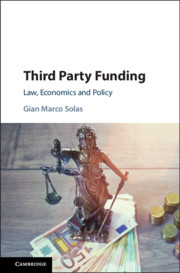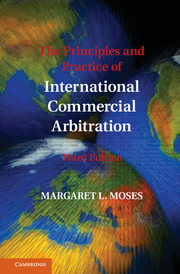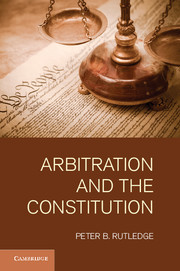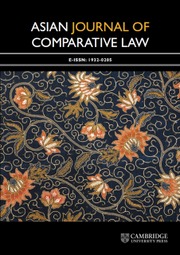Third Party Funding
Law, Economics and Policy
$39.99 (F)
- Author: Gian Marco Solas, Omni Bridgeway, The Netherlands
- Date Published: June 2022
- availability: Available
- format: Paperback
- isbn: 9781108703147
$
39.99
(F)
Paperback
Other available formats:
Hardback, eBook
Looking for an examination copy?
This title is not currently available for examination. However, if you are interested in the title for your course we can consider offering an examination copy. To register your interest please contact [email protected] providing details of the course you are teaching.
-
In Third Party Funding, Gian Marco Solas, for the first time, describes third party funding (TPF) as stand-alone practice within the wider litigation and legal services' markets. The book reports on legal issues related to TPF in both common law and civil law jurisdictions, and in the international context. It then discusses the incentives and economics of TPF transactions in different legal contexts while explaining how the practice emerged and how it is likely to develop. In addition, the book offers practical insights into TPF transactions and analyzes a number of regulatory proposals that could affect its use and desirability. This work should be read by scholars, practitioners, policymakers, and anyone else interested in how TPF is changing the practice of law.
Read more- Addresses thoroughly the legal issues related to third party funding (TPF) from a civil law perspective
- Allows readers to make a more accurate economic analysis of this practice through a broader, more complete comparative legal overview and practical business experience
- Provides comprehensive legal and economic analysis that allows policy discussions to be faced at different levels and internationally
Reviews & endorsements
'Essentially this book presents a copiously researched study aimed at enabling readers to make at least a better-informed judgment of the advantages, or otherwise, of third party funding. It will almost assuredly pique the interest of academics and practitioners alike and anyone else seeking an enhanced understanding of the ins and outs, not to mention the rights and wrongs, of TPF [Third Party Funding]. Elizabeth Robson and Phillip Taylor, The Barrister
Customer reviews
17th Oct 2024 by UName-456522
THIRD PARTY FUNDING FOR PROBLEM LEGAL FEES? HERE’S A COMPREHENSIVE ANALYSIS An appreciation by Elizabeth Robson Taylor of Richmond Green Chambers and Phillip Taylor MBE, Head of Chambers, Reviews Editor, “The Barrister”, and Mediator Of ongoing concern to lawyers as well as the general-public, is the ever-present problem of access to justice paying for it, that is. Going to law is always expensive. Therefore, how do you — or actually your clients — finance it? If legal fees, court fees and so forth are beyond reach, especially now that legal aid provisions have been radically reduced, could the answer — or at least one answer — be TPF? ‘TPF’ refers to third party funding — hence the title of this timely, if potentially controversial title from the Cambridge University Press. According to the author Gian Marco Solas, third party funding is generally defined as ‘…the professional practice of funding the costs of a dispute in exchange for a share of the sum recovered (but) only in the case of victory, sometimes entailing the transfer of the claims, this not being made by lawyers of insurers.’ The assumption here is that the ‘third parties’ who have provided the funds get a (presumably) pre-agreed sum if the case is won, but not a penny if it isn’t. The point is made that, as very few authors have outlined ‘a systematic view of this practice’, this book now provides one, namely a ‘static vision of the problem’. In summary, the author explains that this book is ‘the first attempt to do a comprehensive analysis of TPF as a business phenomenon.’ We are assured that litigation funding of this nature can be applied in both civil and common law jurisdictions. The book’s introductory section describes a series of funding practices ’that would be potentially capable, one way or another, of providing an alternative opportunity to access justice and solve disputes, rather than using the parties’ own funds.’ Said ‘series’ includes most, or all forms of ‘alternative litigation funding’ (ALF), from legal expenses insurance, to contingency fees, to conditional fee agreements. The latter two of these have come under fire from time to time, among quite a few lawyers in quite a few common law jurisdictions. It is interesting that the book has set out to explain or explore, the possible circumstances in which third party funding could be regarded as ‘more efficient’ than other ALF methods. Read, note and contemplate all this if you will. Essentially this book presents a copiously researched study aimed at enabling readers to make at least a better-informed judgment of the advantages, or otherwise, of third party funding. It will almost assuredly pique the interest of academics and practitioners alike and anyone else seeking an enhanced understanding of the ins and outs, not to mention the rights and wrongs, of TPF. The date of publication of this hardback edition is cited as at 7th November 2019.
Review was not posted due to profanity
×Product details
- Date Published: June 2022
- format: Paperback
- isbn: 9781108703147
- length: 364 pages
- dimensions: 229 x 152 x 19 mm
- weight: 0.491kg
- availability: Available
Table of Contents
Acknowledgements
List of abbreviations
1. Introduction
Part I. A Comparative Overview:
2. An historical overview
3. Third party funding: a comparative legal and factual overview
Part II. An Economic Analysis:
4. The emergence of the litigation market and third party funding
5. An economic analysis of third party funding
6. Social impact of third party funding
Part III. Contractual, Regulatory and Policy Considerations:
7. Third party funding transactions and related proceedings
8. Regulation of third party funding and other policy issues
9. Conclusions
Bibliography
Index.
Sorry, this resource is locked
Please register or sign in to request access. If you are having problems accessing these resources please email [email protected]
Register Sign in» Proceed
You are now leaving the Cambridge University Press website. Your eBook purchase and download will be completed by our partner www.ebooks.com. Please see the permission section of the www.ebooks.com catalogue page for details of the print & copy limits on our eBooks.
Continue ×Are you sure you want to delete your account?
This cannot be undone.
Thank you for your feedback which will help us improve our service.
If you requested a response, we will make sure to get back to you shortly.
×




